为庆祝农历十二月初八《佛陀成道纪念日》,又称《法宝节》,国际佛光会马来西亚协会大学园第二分会慈善组供十位组员于8/1/2022 ,10.30am派发腊八粥于八个福利团体结缘。有爱心老人院,IQ70,维爱福利中心,诚爱残障中心,Shelter Home, Rumah Hope,友善残障中心及同心乐龄关怀中心。
大学园第二分会慈善组
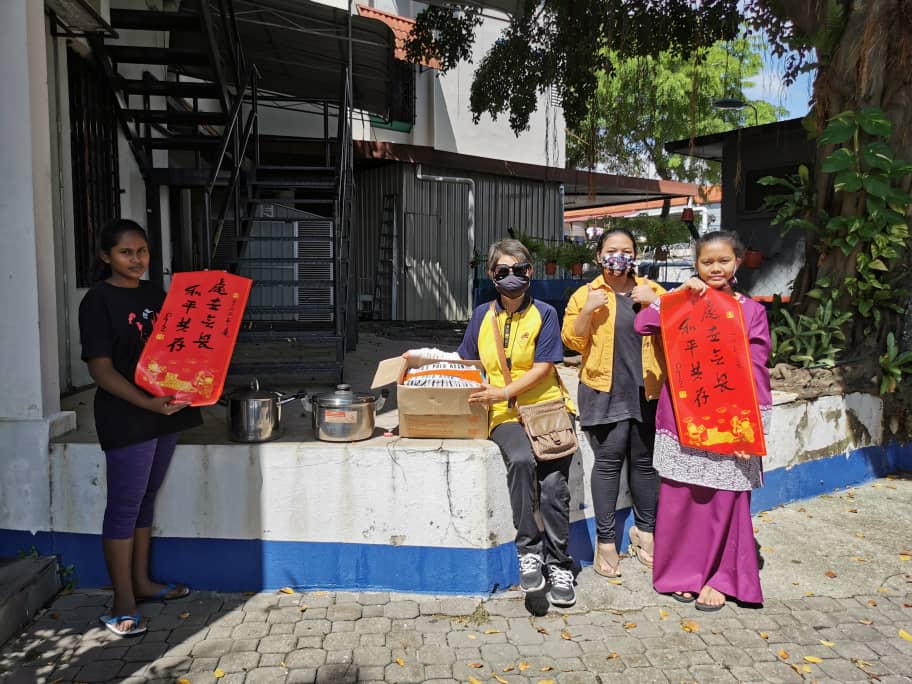

为庆祝农历十二月初八《佛陀成道纪念日》,又称《法宝节》,国际佛光会马来西亚协会大学园第二分会慈善组供十位组员于8/1/2022 ,10.30am派发腊八粥于八个福利团体结缘。有爱心老人院,IQ70,维爱福利中心,诚爱残障中心,Shelter Home, Rumah Hope,友善残障中心及同心乐龄关怀中心。
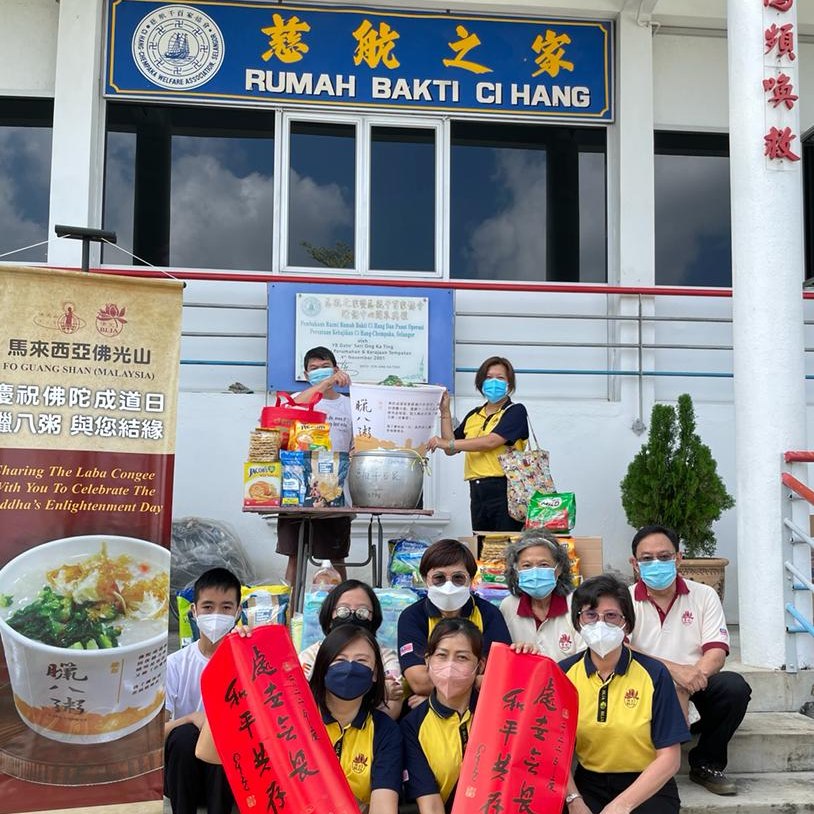
09/01/2022 (星期日) 马来西亚佛光山文教中心为了和大众同庆与纪念佛陀成道纪念日(农历十二月初八),将于 2022年1月09日向公众派送腊八粥。英文護法共有21位委员和义工协助常住将腊八粥派送给十五间福利中心。由于疫情的关系,今年与往年不同。几天前,委员们联系了十五间福利心,以确定人数。然后在派送的前一天前往各个福利中心领取大锅并送去中心,让常住当天能盛装美味可口的腊八粥派送给每个福利中心。常住为当天早上前来协助的各个委员和义工准备了可口美味的早餐。按照操作规程,各个委员和义工准时来到马来西亚佛光山文教中心,也依据做业程序,采取了预防措施在还没进入道场就消毒和带好口罩,一些帮忙打包单碗的腊八粥的义工们就戴上手套和头套。随后,各个委员和义工把准备好了的腊八粥和星云大师墨寶【處世無畏,和平共存】賀年主題春联一同前往15间福利中心派送。与往年一样,英文护法慈善组筹到会员的捐款买了一些米粮,干粮,成人尿布以及一些清洁日常用品给慈航福利中心的老人家。这次的活动在中午12点半前就圆满派送完毕。各个福利中心的老人,小孩都能享用美味可口的腊八粥午餐。
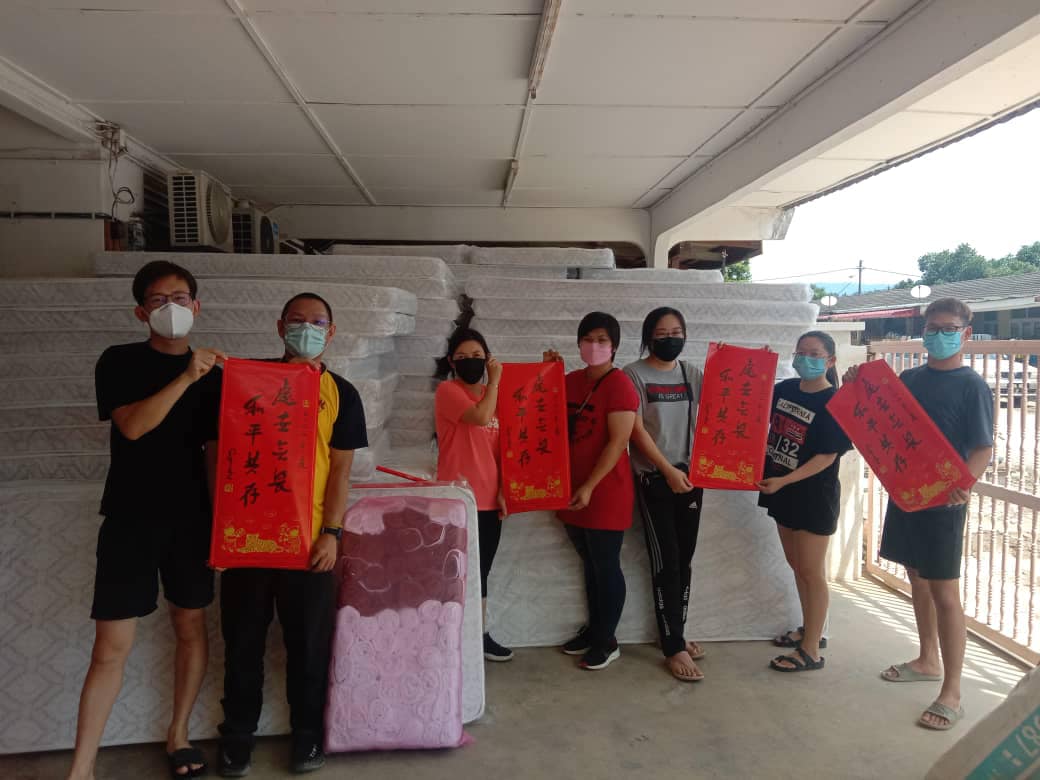
我國目前水災災情雖已緩和,烏魯冷岳縣是嚴重災區之一,災後災民家具和物品被水流沖掉或浸壞。 在佛光文教中心副住持如行法師協助,蒲種分會在5/1前往烏魯冷岳十四英里呀吃華人新村派送200張單人床褥、260件毛巾及送上星雲大師春聯墨寶“處世無畏,世界和平“祈願災民在新的一年,處世無畏,面對災情,戰勝困難。會長劉春蘭帶領理事委員團隊一行人,在村長王經倫與協調員黎小慧的帶領下,前往發送救援物資給200戶人家,村民都前來迎接,表達謝意 。 村長王經倫感謝佛光義工,前來慰問及捐助災民,讓他內心充滿暖意。共同関心該區災民,協助災民渡過難関。

馬來西亞佛光山监狱弘法組共32人于1月2日在東禪寺舉辦了全天的弘法培訓。此培訓分兩段:上午是“监狱布教之路-难行能行”講座會,由佛光山新马泰印教区总住持觉诚法师及美国寂静禅舍宗教導师开照法师主講;下午則是司法器、誦經的培訓,由有月法師指導,最後是新舊弘法組員的心得交流。因爲疫情而停滞了将近两年的監獄弘法,將快會重新啓動。這一天的培訓為本年一系列的培訓揭幕,除了給久沒布教的組員溫習,更是給新的組員實習的機會。慧护法师在开场開示表示欣喜更多佛光人加入弘法行列。監獄弘法是易承担的任务,需要大家的发心去成就。而弘法人員要具備厚實的佛法的根基才能有效的把佛法带给他人。上午的講座會由劉耀華師兄主持。開始時,总住持觉诚法师先感谢有因缘礼请到监狱布教30餘年的的开照法师,亲自来为大家授课,叮嚀大家要认真学习。总住持说弘法時应该从因着手,让小孩子接触佛法–佛法入心,就能自律、自觉、自改,这样就很难会犯错。我們雖然錯過了在囚友小時候給他們弘法的機緣,但現在還是可以把佛法與他們分享。這就如同要把害虫去除,让生病的树得以健康成长,虽然不能改變过去,但他們能展望未来。开照法师开示时說他當初是被动地隨從指示去監獄弘法。可是他渐渐地从了解到囚友们的问题和经历过程后,再进一步的看到囚友渴望学习的态度或听闻佛法后身心有所改善,就被他们深深的触动了。監獄裏的弘法讓开照法师发现佛法原来是那么的实用,感受到佛法能帮助我们对治问题。他說自己能坚持地走到今天是因为有佛法在背后支撑着、推動著他。開照法師說佛法如药,我们要灵活的运用,让对方从中生起信心导向善行,了解佛法与生命是息息相关的。組員問及如何建立心態才可以對監獄弘法不放棄,開照法師大説要对囚友谅解包容,以平等心对待,我們不能有所求,不然这条路就很难持续走下去。而身为弘法人员一定要有佛学基础,有佛法理念做为架构,才不会被外境牵引。重要的是在弘法的过程当中,不要把成就取決於囚友的改變,而是要看到自己的成长。最后开照法师勉励弘法人员要在佛法上精进,提升自己、挑战自己、超越自己,不执取成功或失败。只要坚持做、继续做,監獄弘法的路虽然难行,但还是可行。觉诚法师形容监狱里的同学就犹如地狱众生在人间。我们要不断的给予他们福德因缘,让囚友可以成为污泥中的莲花。让囚友了解因缘果报的关系,达到自我的醒觉。除此之外,禅修课也非常重要,要让囚友们习惯修持,念念正念。总住持也提醒大家要清楚监狱的规矩,不可触犯。面对问题时,可以大家一起討論,体现团队精神。对自己要有信心,要以佛法来翻转对方的生命。最后以“要学观世音菩萨的慈悲、学文殊菩萨的智慧、学地藏菩萨的坚持、学普贤菩萨的行愿”来勉励弘法人员。兩個小時的講座會圓滿結束后,縂主持與開照法師互贈禮物結緣。開照法師把他《吉祥經》的墨寶送給東禪寺,也送了他的著作給弘法組。縂主持以星雲大師墨寶“處事無畏 和平共存” 回贈開照法師。午斋后,有月法师带领弘法組學習司法器和誦經,以便每位弘法人員都可以在監獄裏帶領囚友誦經。我們不少組員都未曾司法器,所以都非常珍惜這一堂課,大家都积极地參與。爾後是由弘法組組長羅炳傑師兄主持一場新舊組員的交流。新的弘法人員當場實習,而舊組員扮演囚友,給大家來個模擬布教體驗。培训课程于下午5时圆满結束。

我國目前水災災情雖已緩和,但災後災民家具和物品被水流冲掉或浸壞,急需各界支援補給文冬縣是嚴重災區之一,星洲日報基金會副主席蕭依釗和馬來西亞佛光山總住持覺誠法師曾帶領義工團隊,在聖誕節在該區進行“水災獻溫情“活動,経己派送200張單人床褥、枕頭,以及食物籃各新村災民和貧病者。佛光文教中心副住持如行法師,再次接悉文冬德教會紫覺閣拿督葉玉欽閣長反映文冬縣吉打里區孟加里村災區嚴重,急需大家支援救濟品。副住持如行法師義不容辭,馬上籌集100張單人床褥和枕頭,240條毛巾,新T恤、女性內衣等,及送上星雲大師春聯墨寶“處世無畏,世界和平“祈愿災民在新的一年,處世無畏,面對災情,戰勝困難。副住持如行法師帶領佛光義工團隊,星洲日報基金會。一行人,在拿督葉玉欽引導下,到達泥垢未除,路面泥濘的村居時,再次發送救援物資給40多戶人家,村民都前來迎接,表達謝意 。村民張文忠反映,這是在2004年後最嚴重水災,他描述在12月18日,水開始湧入屋時,除了將貴重物品移到高処,他和妻子也一直从椅子到桌子往上爬,那時水深10尺,情勢十分驚險。他也感嘆,活了一輩子過去常捐助舊衣服給慈善机構,今日遇水災,反而是生平首次穿別人捐助的衣服。他感謝如行法師帶領佛光義工,前來慰問及捐助災民,讓他內心充滿暖意。副住持如行法師鼓勵災民要堅強面對生活的困難。另外拿督葉玉欽希望本區國州議員共同関心該區災民,協助災民渡過難関。
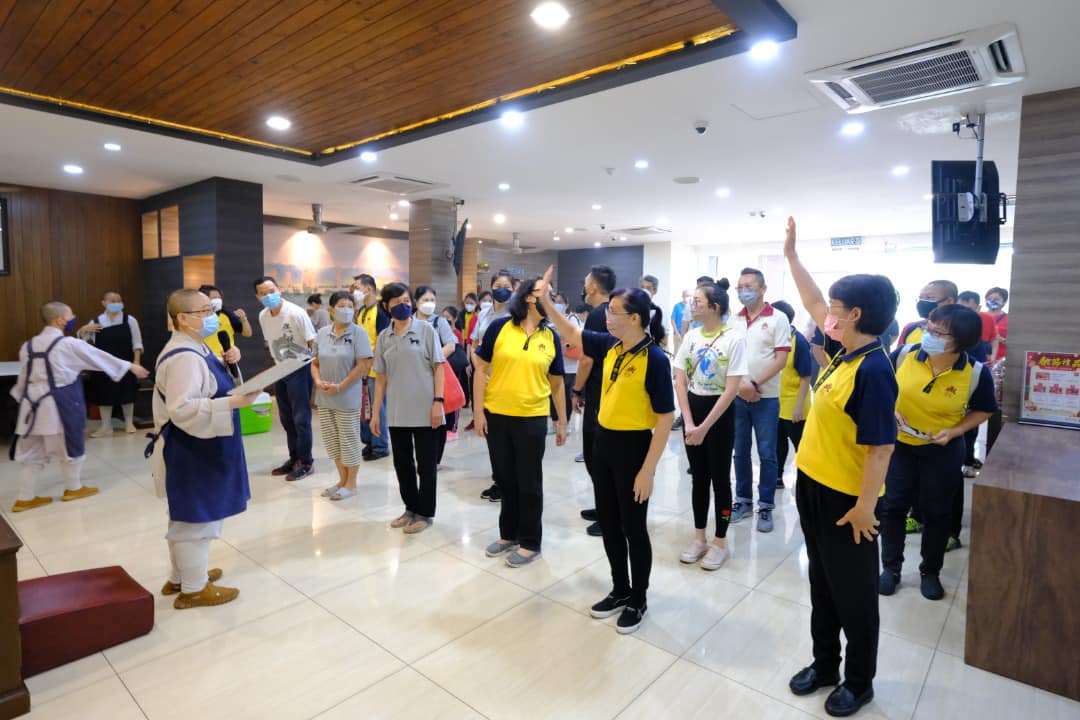
佛光山文教中心於今日2022年1月1日元旦日,進行出普坡活動。早上9點,在文教中心活動的大學園分會,大學園第二分會,英文護法分會,加里爾峰分會,八打靈分會,蒲種分會共6分會會長帶領會員們參与,以及社教班的家長心靈成長班,大寮的義工們,以及青年團,小朋友們,總共有80位發心參加2022年首個除舊迎新的活動文教中心副住持如行法師開示,感謝大家回到中心,以勞動的心,進行出普坡,讓道場煥然一新,隨後誦經祝禱,恭讀星雲大師義工祈願文,三皈依。副住持如行法師依場地分為各區域,調派人手,由各法師帶領帶領團隊,投入工作。義工們从清抹大堂的觀世音聖像,流通處的佛像,大雄寶殿殿的三世佛及小佛像,以及打掃各層的場地設備,清除廢品,整理圖書用品等都以虔誠之心作業,並感恩在疫情期間,能帶孩子們回來親近道場,都用心耐心服務奉獻,讓道場煥然一新。這次出普坡活動,顯示大家以処世無畏的精神,合群合力,在中午12.00時,已圓滿結束並祝願在新的一年。世界和平,展望新希望。
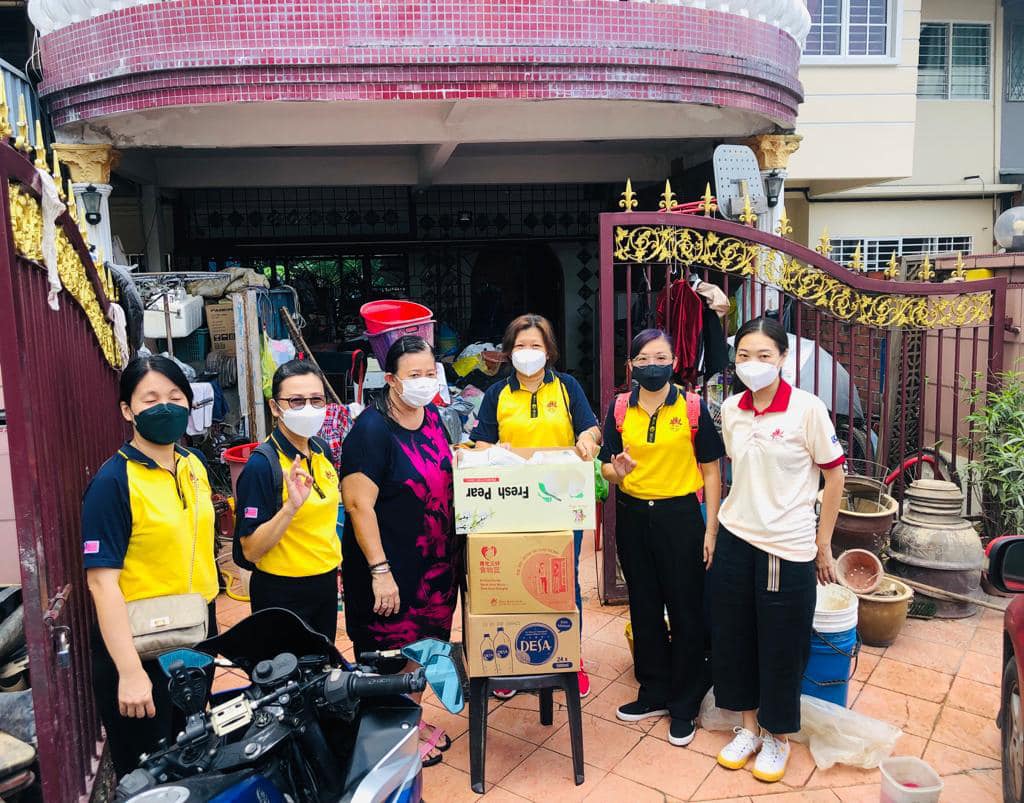
12月18日因連續的大雨,座于泗岩沫及聖淘沙之間的Kasipillay 甘榜遭河水暴漲而造成嚴重水災。當收到訊息災民眾申請物資有食物及生活物品及、口罩及自行唾液心冠肺炎检验器,尤其是床褥。在佛光山文教中心副住持如行法的號召下,英文護法分會及八打靈分會的兩位會長帶領了委員和會員共12人于早上10點半出發前往發放物資和便當。共有11家遭受嚴重水浸而申請物資。據災民描述,河水在半夜12點多開始入浸,而且是快速的上升。很多東西都來不及垫高起来。水深至腰部,比較地洼的地區水深達到7尺。有些家庭被迫離開到親戚的家暫住,損失慘重。當收到物資時,他們都展開了笑容,尤其是看到床褥時更是鞠躬致谢連連。我們在尋找這些家庭的時,受到衛星導航系統的問題,导致延誤了送便當的時間。一些路更是因為垃圾的阻碍不能前進,而且沒有其他人口。所幸遇到村長。村長告訴我們有2戶人家還在收留中心還沒回家。他可以代收並交給他們。他也幫我們領路到其他災民的家。剩下的一些物質我們交給村裏的一間廟,讓廟裏的負責人派發給須要的村民。雖然我們能給予的遠遠超過他們的所須,但是今天所發放的便當、三好食物籃、簡單的生活用品及床褥已是足夠讓他們暫時安住身心。脤災活動在中午1點半結束。
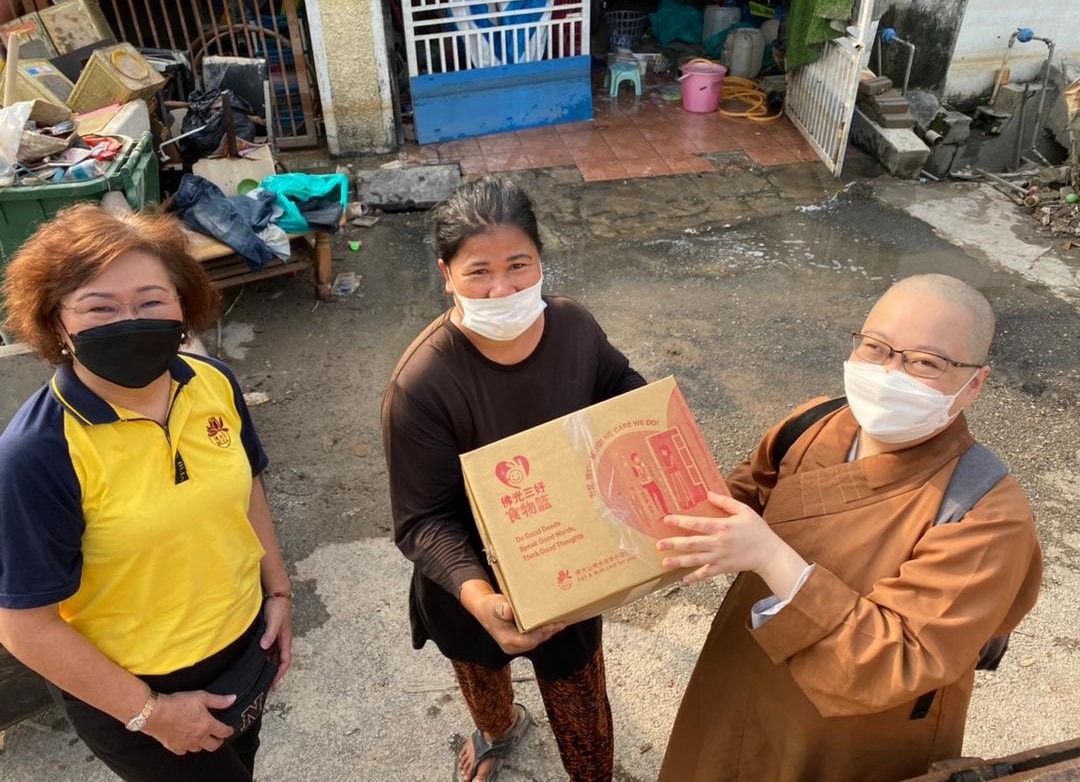
(人間社記者馬來西亞沙亞南25日報導)
在雪蘭莪州大水災中受到重創的沙亞南太子園,受災雖已一周,但災民仍需要各方面的協助;因此馬來西亞佛光山佛光文教中心副住持如行法師秉持星雲大師「三好四给」的精神,在12月25日帶領佛光人到災區發放三好食物籃。
參與這次賑災行動者有佛光文教中心及国际佛光會马来西亚中马协会旗下的6个分会,也就是大学园第一分会、大学园第二分会、英文分会、加里尔峰分会、冼都分会及蒲种分会的幹部及義工共100人,出動19辆皮卡(Pick Up )分6區发放1000個食物篮。
行動的总指导是馬來西亞佛光山總住持觉诚法师,由佛光文教中心副住持如行法师帶領,中马协会副会长谢木辉指導,而巴生分會會長陈山林和巴生新镇会长张锦华則是執行長。
發放團隊在9時出發前,做了新冠病毒自我检测,以确保大家的安全。3個小時后,1000個食物籃在中午12時全數發完。
马来西亚巴生河流域多個城鎮自上周五(19日)經歷连續36個小時的豪雨之后,頓成澤國,水位超過10尺,许多居民仓猝逃离,一夜之间无家可归,唯有暂时住進疏散中心,一些災民在雨停後甚至被迫爬到屋顶挨过一晚。佛光人本着菩萨慈悲精神,在新马泰印总住持觉诚法师带领下,多日来进出重灾区救济灾民。
今天的活动旨在分发1000份 “三好食物篮“ 给 雪州莎亚南太子园的居民。此住宅区居民说他们多年不曾遭水灾之苦,但这回家园被淹没数日,积水于24日方才全退,是巴生谷此次水灾最严重地区之一。
行动开始前,副主持如行法师开示, 感谢大家在聖誕節假期仍然发心出力,把礼物(食物篮)送给灾民,并叮咛大家务必照顾好自己,那才有能力照顾别人。中马协会会长杨翠蓮致词時給予鼓励,她说「大家都是一条心,共患难,为了做有意义的事而来。加油!」
灾後的积水雖然已在23日消退,但是屋內屋外到處都是泥泞,而且沿路盡是堆积如小丘的丢弃家具、电器、书本、破磚破瓦。许多车子在泡水後仍留在原地,覆盖着一层褐土。
佛光人开车进入灾区时,有些道路和小巷因堵塞或道路破坏,車子无法进入,尽管食物篮甚重(近15公斤),佛光人还是一箱箱抬着步行到有需要的居民府上。
放眼看去,許多災民正在清洗家园,虽然苦恼房子满是泥泞,但看见佛光人發放三好食物籃,他们都绽开笑容,聲聲感谢。一些災民说干粮来得正是時候,這都是所需要的,鼓舞了佛光人更发心地分发食物篮。
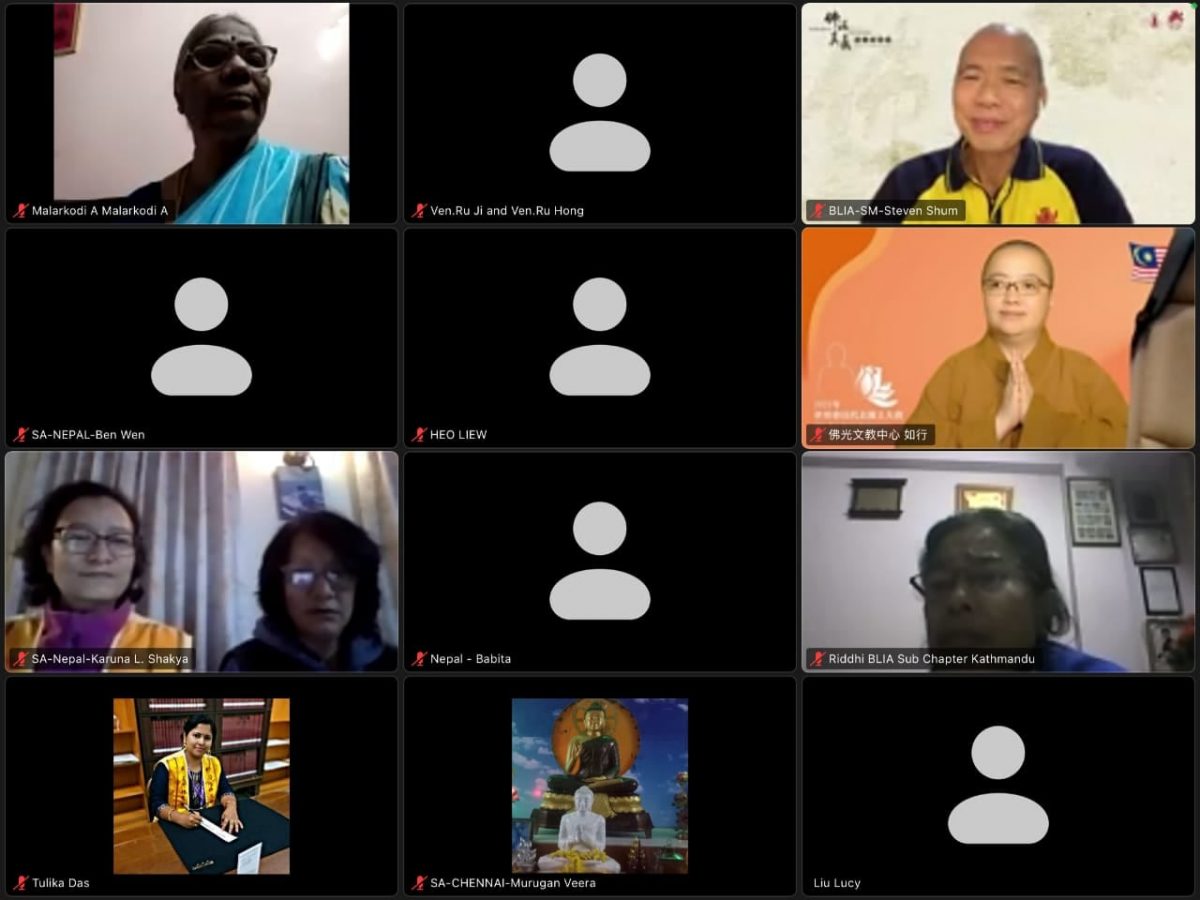
South Asia Humanistic Buddhist Study Group Report
Report writer: Dr. Karuna Laxmi Shakya
Name of Chapter: Kathmandu Sub- Chapter
The session was started by reading each paragraph by participants turn by turn. After that discussion started and participants participated in the group discussion. There were nine different guiding questions put by Ven. Mia Ru for discussion smoothly. The flow of report is accordingly each guiding question.
The first question was “What are four Immeasurables? Could anyone answer this?” – in this regard, participants told that the four Immeasurbles are loving kindness, compassion, Joy and Equanimity. Upholding four measurables not only will one’s merit and wisdom increases, it also eliminates afflictions.
The second question was on “How does the Immeasurable loving kindness benefit in your life? Any incidents that you want to share with us regarding this question?”. Participants shared their experiences in different perspectives like Sis Bashu (Nurse), Kathmandu Sub chapter member shared her experience of working with elderly people, who are suffering from dementia. If they are dealt with love and kindness, they behave well and cooperate well. Si Gu Ben Won said “I did dealing with community in Bodha Gaya with love and kindness, in the result they (community people) did not do toilet in our land”. Ven Mia Ru mentioned that even one has anger outside to get the things done, always keep compassion and love inside the heart for people.
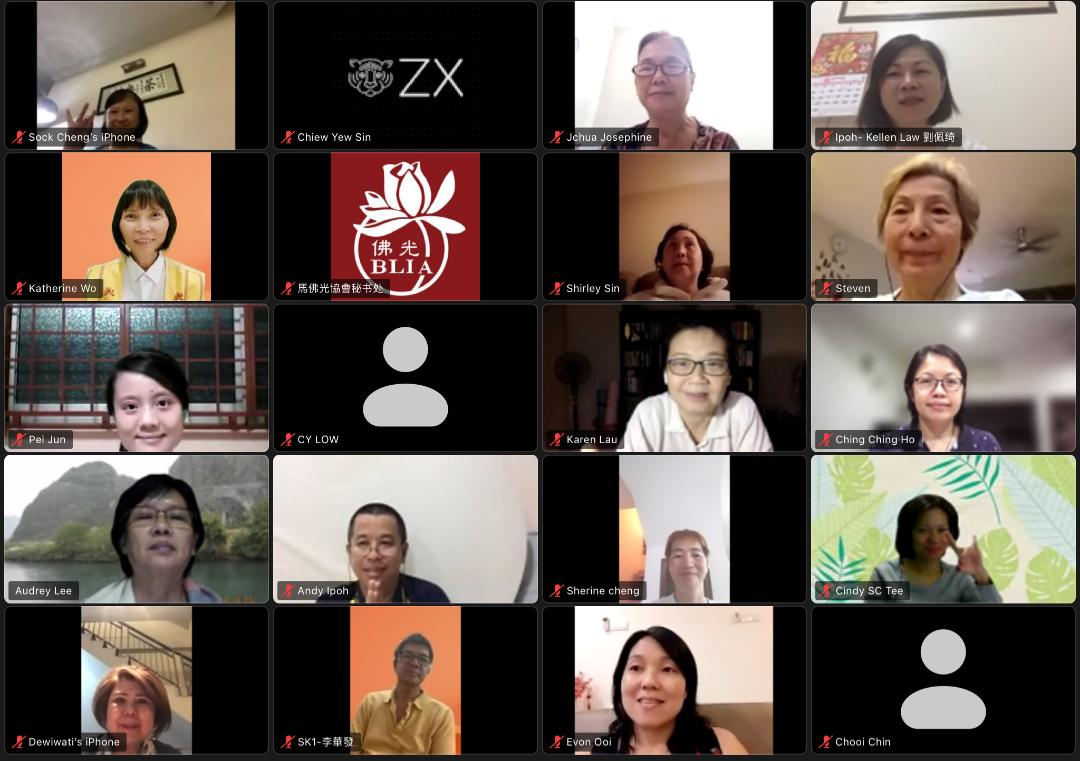
Topic: Buddha-dharma: Pure and Simple — Three Acts of Goodness
A total of 33 readers joined this session facilitated by Venerable Miao Tan.
In this passage, Venerable Master Hsing Yun emphasised the importance of practicing the Three Acts of Goodness — Do Good Deeds, Speak Good Words and Think Good Thoughts, because according to Master, spiritual cultivation starts from cultivating wholesome physical, verbal and mental karma. It embodies the essence of the Buddha’s teaching and contain the profound Dharma that holds true to the original intents of the Buddha. Master also aimed to remind us that the Three Acts of Goodness is not just a slogan, but rather, it is a mission to put into action. He also transmits the message to us to cultivate good karma.
In this session, Venerable Miao Tan shared her views how we can cultivate good karma by applying the Three Acts of Goodness and practice with the Five Precepts.
1) Refrain from killing is a practice of compassion. One of the ways introduced by Venerable Miao Tan is to become a vegetarian. The wholesome effect of this practice is we will create a healthy ecosystem for everyone to live in harmony.
2) Refrain from stealing promotes righteousness. An example quoted by Venerable is, as Buddhist, we can contribute to save this Earth by not stealing lives from nature, such as cutting trees, harvesting pearls, minerals, etc…
3) No lying is to build trust by saying good words. Slandering or gossiping cause problems between people. Therefore, we must always say good or encouraging words and respect the reputation and credibility of other people.
4) No sexual misconduct is a practice of doing good deeds and in so doing, cultivating good thoughts. When one practice good conduct and behaviour, we create a harmonious society and build a trusted relationship with people around us.
5) No intoxication promotes the practice of speaking good words. Intoxicants are stimulants that poisons the body and mind. By refraining from intoxicants is to respect the health and intelligence of oneself and others, thereby enhances wisdom and forming good affinities with people.
In a nutshell, by upholding the Five Precepts, we are embracing all the Three Acts of Goodness; doing good deeds is to cultivate wholesome actions to purify one’s karma; speaking good words is to cultivate wholesome speech to purify one’s verbal karma; and thinking good thoughts is to cultivate wholesome thoughts to purify one’s mental deeds. One reader highlighted a good point that talking with the right intonation also promotes the act of speaking good words.
Master’s compassion is always with us as he remembered to offer advise to those who had unfortunately conducted unwholesome actions. The two ways that Master taught are to repent and make vows. By making sincere repentance, one can lessen the severity of unwholesome karma and by making vows to practice the Three Good Acts diligently, it will give rise to wholesome and virtuous thoughts. These three actions may seem simple but it contains the profound teachings that Master advocated in Humanistic Buddhism and, as reminded by Venerable Miao Tan, we must cultivate these virtues and pass down to our next generation so that society will become more harmonious and the world a better place. With that, the class ended with the Transference of Merit. May all be well and happy!
Copyright © 2021 马来西亚佛光文教中心 FGS PJ SS3. All rights reserved.
Fo Guang Shan (Malaysia) 201101034343 (962476-H)
Copyright © 2021 马来西亚佛光文教中心 FGS PJ SS3.
Fo Guang Shan (Malaysia) 201101034343 (962476-H).
All rights reserved.
Copyright © 2021 马来西亚佛光文教中心 FGS PJ SS3. All rights reserved.
Fo Guang Shan (Malaysia) 201101034343 (962476-H)